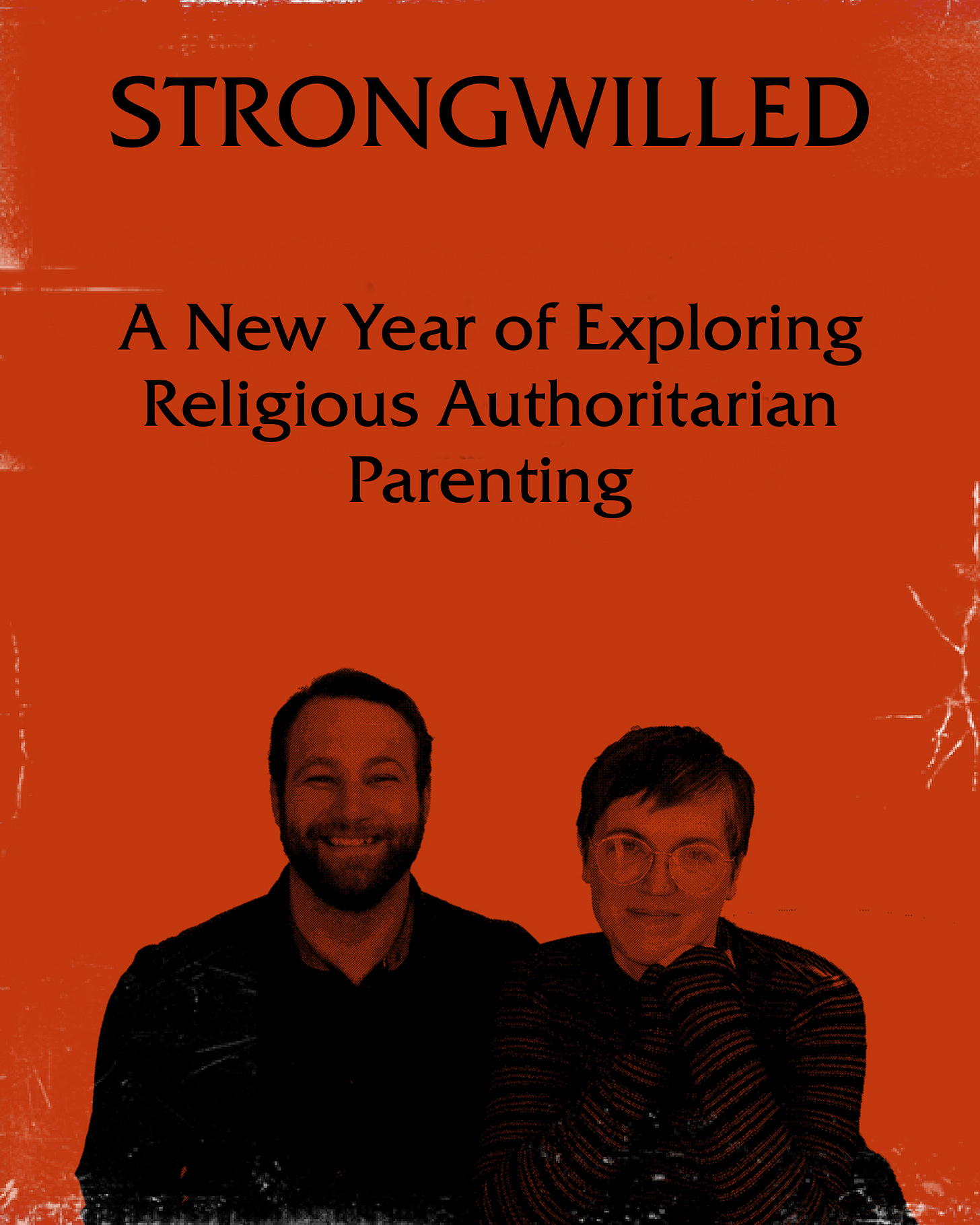A New Year of Exploring Religious Authoritarian Parenting
Continuing to explore the impacts of RAP
STRONGWILLED is a reader-supported publication. Thank you to everyone who has supported this publication and enabled it to exist. If you appreciate our work, please consider subscribing, sharing, or financially supporting this survivor-centric project.
Hello everyone! We know that so many of you are holding dread, fear and sadness as inauguration day looms heavy. We hope you’re taking care of yourself and loved ones during this tough time. We believe that care, nervous-system regulation and community are antidotes to authoritarianism, and hope that you find ways to nurture yourself this month.
We took some time off over the holidays from thinking about religious authoritarian parenting. It’s been some much-needed rest after publishing fourteen chapters on the topic — and that excludes a handful of other posts and several podcast episodes. We’ve been intentional about taking a mental break from this project, both to come back with fresh eyes, and simply because rest is important!
After catching our breath, we’re taking the rest of the month off to continue to prioritize our mental health and to work on upcoming chapters. There’s still a lot to cover, as we haven’t yet talked much about neurodivergence or sexual and gender diversity, among other important topics related to growing up with religious authoritarian parenting.
Thank you so much for your support and engagement with this non-traditional publishing project. We’re excited for continuing this conversation this year (and that is saying something, considering the heavy nature of the topics we cover).
We’d love for you to leave a comment or email (scroll down to the end for that info) about what you think we should cover in the new year. And while we work on new content, make sure to check out the chapters and podcast episodes we published in 2024:
Chapter 1: What is Religious Authoritarian Parenting?
Chapter 2: Under Pressure: What is it like to be child in a Religious Authoritarian home?
Chapter 3: The Beginnings of the Religious Authoritarian Parenting Movement: How the 1960s and social progress movements sparked a long-term backlash that continues on to the present day.
Chapter 4: The Promises of Religious Authoritarian Parenting: What did Religious Authoritarian Parenting experts promise?
Chapter 4: Children as Casualties of the Culture War: What happens to a person when their childhood becomes a battlefield?1
Chapter 7: Adolescence and the Illusion of Choice: Looking for both Self-Expression and Belonging
Chapter 10: Spare the Rod, Spoil the Child: The State of Corporal Punishment in the U.S.
And here are the podcast episodes we’ve put out last year:
Send this Episode to Your Therapist
Send this Episode to Your Therapist Part 2
Corporal Punishment and Brain Development (With Tori Williams Douglass)
How Do You Set a Boundary in a Family Like this?
Krispin's Story of Estrangement
What should we cover in the coming year?
As we consider what to tackle next regarding religious authoritarian parenting, we’d love to hear from you as we strive to make this project survivor-centric:
What are aspects or impacts of religious authoritarian parenting that don’t get enough air time?
Are there any topics that we’ve touched on that need more attention or a deeper dive?
Are there any questions you have about the history of this movement?
Leave a comment below or shoot us an email at strongwilledproject@gmail.com
STRONGWILLED is a reader-supported publication. Thank you to everyone who has supported this publication and enabled it to exist. If you appreciate our work, please consider subscribing, sharing, or financially supporting this survivor-centric project.
Whoops, Krispin mis-numbered this one, so we have two chapters 4’s.





I’ve been thinking a lot about how the whole “in the world but not of it” really impacted my worldview and concept of reality.
We were very sheltered from pop culture, and very in-depth in scripture and Christian media. I never could relate to my peers in school or the neighborhood, and I don’t know if that was intentional on the part of RAP methods or just a byproduct, but it became such a barrier to friendships with others outside our little enclave.
I'm looking forward to exploring the neurodivergent component as well. My wife and I are both autistic cult survivors, and we have a theory that cults/high control groups attract neuro-spicy folks because of all the rules and the scripts. Super fascinating, super sad.
I'd also love to learn more about how RAP represses sexuality of any kind, but especially non-heterosexuality. I know it has been mentioned several times, and I think it deserves its own chapter {or two}.
FWIW, my wife is a therapist specializing in neurodivergence, religious trauma, and Queer folks. As she likes to say, "the Venn diagram is a circle."